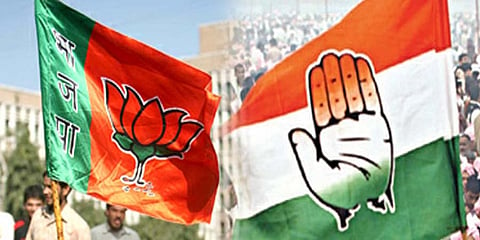
- Home
- Live Blog
- Breaking News
- Top Headlines
- Cities
- NE News
- Sentinel Media
- Sports
- Education
- Jobs

The political issues overshadow the environmental issues in Lok Sabha polls, but the perceptible impact of climate change calls for parties to spell out clearly how the government to be formed proposes to address environmental issues. The environmental issues have become prominent with the major players, the ruling Bharatiya Janata Party (BJP) and the opposition Congress dedicating special chapters to them in their poll manifestos. Fulfilling the promises made is crucial for sustainable growth, as the precipitation of climate change impacts and environmental crises may derail the train. The BJP, in its Sankalp Patra, packaged as “Modi Ki Guarantee 2024,” has promised to use both traditional wisdom and modern practices to contribute to a healthier planet. The ruling party pledges its commitment to increase non-fossil fuel capacity towards net zero emissions by 2070. It highlights the achievement of the Modi government of 44% of electricity generation capacity from non-fossil fuel sources. Fossil fuels continue to account for 56.3% of India’s energy mix, with coal having the largest share at 48.7%. The country's reduction in import- dependence to meet demand for solar cells and bring down the upfront cost of solar power installation is critical to achieving success under the Rooftop Solar programme. Augmenting domestic manufacturing of solar cells along with solar modules is crucial for matching the demand for increased installed solar power capacity. Failure to increase installed solar capacity will only pose hurdles to phasing down coal for electricity generation. The BJP has also promised to set up a Scientific Research Fund with an investment of Rs 1 lakh crore to provide loans to promote scientific research. Implementation of this promise bears huge promise as the country lags far behind in research and development. Against 1370 researchers per one million population in China, there are only 252 researchers, while against five lakh patents awarded in China, only 23,000 patents are granted annually in India. Two other key promises in the Sankalp Patra have great significance for Assam and other states in the northeast region. These are “a disaster-resilient Bharat with minimum casualties and losses due to natural disasters by evolving appropriate technical and policy initiatives and working with the state government and all stakeholders to manage human-animal conflict in areas close to forests. Both problems have aggravated in the past decade due tothe impact of climate change and the destruction of forests for human settlement and infrastructure development, resulting in massive forest diversion. Balancing forest conservation, infrastructure, and other development is the toughest challenge, which no government has managed to overcome so far. The Congress party, in its manifesto titled “Nyay Patra,” promises to constitute an independent Environment Protection and Climate Change Authority to establish, monitor, and enforce environmental standards and to enforce the national and state climate change plans. The grand old party showcases the National Action Plan on Climate Change as a policy document prepared under the leadership of former Prime Minister Manmohan Singh in a bid to convince electors about its commitment to protect ecosystems, local communities, flora, and fauna, which pushes for “rapid, inclusive, and sustainable development.” The opposition party promises to launch a Green New Deal Investment Programme focused on renewable energy, sustainable infrastructure, and the creation of green jobs, but has not spelled out the quantum of funds that will be required to implement it. The Congress manifesto further promises appointing a high-level committee to study the issue of landslides in the hill districts, evolve measures to prevent landslides, and ensure citizens’ safety. The Geological Survey of India has already completed a baseline landslide susceptibility mapping, categorising the landmass into three zones: high, moderate, and low. States using the GSI map for undertaking zoning regulation for infrastructure projects need to be prioritised so that zoning regulations are not delayed and infrastructure comes up at locations susceptible to landslides. Other promises in the Congress manifesto include transitioning from the 2008 National Action Plan on Climate Change to a National Climate Resilience Development Mission to ensure that all sectors of development provide protocols for action and measurable targets and setting up a Green Transition Fund in collaboration with the state government and private sector to meet funding requirements for green transition towards net zero by 2070. India and other developing nations need to mount pressure on the developed countries to bear the cost of the global clean energy transition to compensate for aggravating the global warming and climate change crises. The Emission Gap Report 2023 revealed that two-thirds of the population with the highest income, who account for nearly half (48 percent) of GHG emissions, live in developed countries. The manifestos of the two parties have put the spotlight on the climate change crisis, which is aggravating. Time-bound and result-oriented action to deliver on the promises is crucial to overcome the accumulated environmental challenges gripping the country.